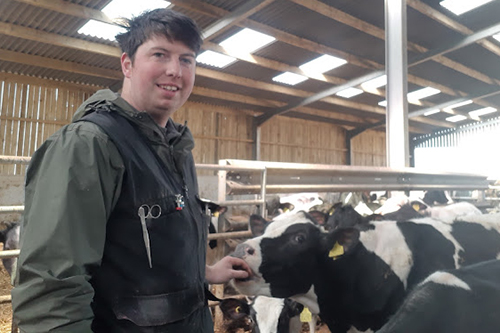
Ross Symons, a beef farmer in Cornwall
Do you work with bovine tuberculosis (bTB)-infected cattle? If so, researchers at the University of Bristol are inviting people to take part in the ZooTB study.
ZooTB, a collaboration between the University of Bristol, University Hospitals Bristol and Weston NHS Foundation Trust (UHBW) and North Bristol NHS Trust (NBT), wants to find out if there is any evidence of the spread of bTB from cattle to people by investigating whether people who work with TB infected cattle develop an immune response to bTB. The study will also look at the public health significance of the disease.
The research team is inviting people over the age of 18 who work with TB-infected cattle in the southwest to an event next Monday, 13 March, at The White Hart, Wrington Road, Congresbury, Bristol, BS49 5AR from
11 am to 2 pm.
The drop-in event will give people the opportunity to hear more about the study and to take part in the research. Refreshments will be provided during the event too.
Participation in the research will involve completing an online consent form, a short questionnaire and providing a blood sample. Participants will have the right to withdraw from the study at any point.
Dr Ellen Brooks Pollock, Associate Professor in Infectious Disease Modelling in Bristol Medical School: Population Health Sciences (PHS), and chief investigator of the study, said: "Bovine tuberculosis mainly affects cattle in the UK. It is caused by the bacterium Mycobacterium bovis (M. bovis) which can also infect and cause disease in a range of animals. The spread of M. bovis to people results in a form of tuberculosis called zoonotic tuberculosis (zTB).
"Individuals who come into contact with M. bovis infected cattle may be at risk of zTB. Currently, we do not have a reliable estimate for the number of people in the UK who may have zTB. Based on reported cases, we assume zTB prevalence to be low, but numbers may be underestimated and that is what our study will help answer."
Ross Symons, a beef farmer in Cornwall, who has been involved in the zooTB study, added: "To anyone thinking about getting involved in research I would say – do it! Being able to bridge the gap between scientific research and the real world is such an important part of any study. Being involved as a public contributor means that you are playing a key part in making the research successful."
Although bTB mostly affects cattle it can affect people too. In the southwest, one in ten people diagnosed with TB are found to have M. bovis. TB due to M. bovis is naturally resistant to one of the first line drugs used to treat TB in people. The study wants to test 160 people in the southwest who work with TB-infected cattle for latent TB.
To check eligibility for the study, visit: https://redcap.link/zootb






